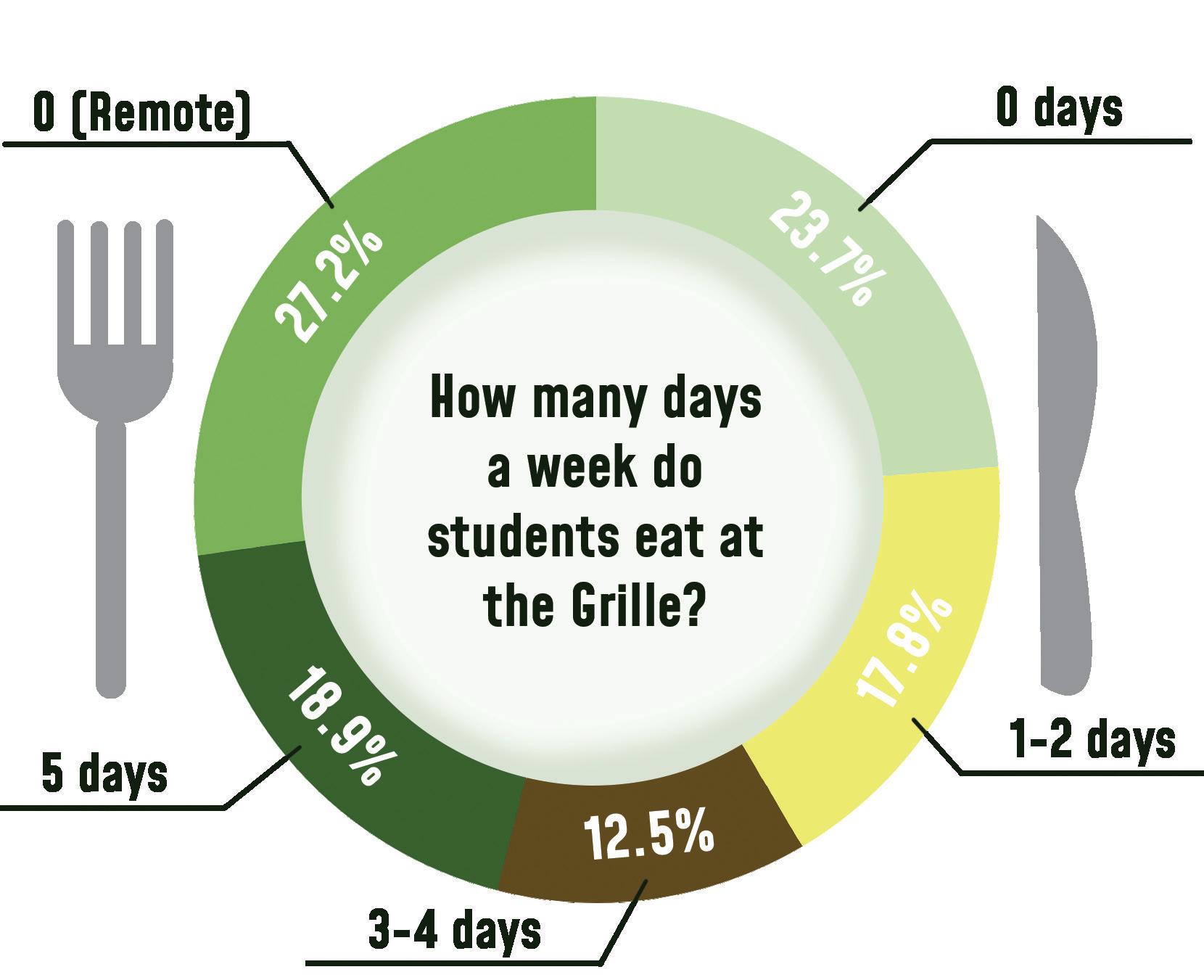March 2O21
Focus
17
THE MODERN FOOD ERA: FROM LAB TO KITCHEN Developing gene editing technology changes the approach to food Article by Maneesh Rajulapati Graphic by Jaidyn Holt
which can release harmful toxins to nearby organisms. This improves the overall quality Venturing into the 21st century, society of plants, global agriculture and food security. stands in the midst of a technological revoluAnother viable use of CRISPR is saving ention. Such modern innovation has even found dangered food plants. Oranges and chocolate its way into the realm of could be gone before 2100, food, redefining and re- “The GM products are but CRISPR can avoid sizing the typical “plate.” such extinctions by creating Thanks to gene editing, safe. There is nothing plants with better longevired carrots, non-browning different about them ty. Aside from helping the apples and decaffeinated actual plant, this will also coffee beans could soon be- except the introduced betters the shelf life of their come everyday meals. How- genes.” products, eliminating excesever, the majority of these sive food waste. - Scottie Smith, AP new food varieties will be However, despite the nuBiology Teacher merous promising benefits, indistinguishable from their non-edited counterparts. In C R I S P R food techfact, it's likely that genetically modified foods nology has many barriers to have already become staples in your kitchen. cross before its products The ability to engineer food to have desir- can fall into consumer’s able traits has made food science an emerging hands. The first obstacle hot topic. The most efficient way to do food is society’s growing conediting has been the genetic modification of cern with the ethics of macromolecules: proteins, carbs, lipids and genetic modification. AP nucleic acids. Current developments in this Biology teacher Scottie area of research have used CRISPR, a gene Smith states that this large editing technology. CRISPRs are specialized public distrust could be due stretches of DNA that control the enzymes to having a misinformed responsible for cutting DNA. Discovered in public. In fact, a majority 2012, CRISPR technology involves introduc- of the food people already ing foreign DNA into an organism in order to consume are GMOs. The enable or disable their genes. For both animals National Center for Food and plants, CRISPR has made the editing pro- & Agricultural Policy recess cheaper and easier. Cancer.gov states that ported that 85% of domesCRISPR has been used for a variety of purpos- tic corn is modified, as well es such as improving immune defense respons- as most brands of corn flake es. Its ability to help protect against viruses has cereals. Other common even led to experimental trials of using CRIS- kitchen items that have PR to detect the coronavirus. already been edited inModern utilization of CRISPR deals with clude cooking vegetapotentially increasing crop yield, which will bles—like potatoes and work to curb world hunger. The World Bank soybeans—fruits, canola finds that GDP per capita increases when pop- and even milk. ulation hunger levels decrease. New accelerat“It’s because people don’t understand these ed plant domestication will help in boosting genetically modified foods. People fear what yield rates. These new plant variants can adapt they don’t understand. If people realised that to changing global conditions by being more they actually consume such foods daily, then resistant to droughts, herbicides, insecticide they’d calm down. GMs are just a faster way and antibiotics. Resistance to the environ- to breed an organism than traditional breeding ment can end the use of pesticides globally, mechanisms. The GM products are safe. There
is nothing different about them except the introduced genes,” Smith said. The public also believes that these types of crops could exacerbate climate change, but this doesn’t have to be the case. Smith said that organisms could be engineered to have elevated carbon dioxide saturation levels, meaning these plants would remove more CO2 from the atmosphere. Further, CRISPR can remove lawn weeds which greatly contribute to CO2 levels. This is done by creating plants that have larger storages for energy. Other obstacles deal with how this tech affects the economy. At the current moment, farmers and small businesses make up the foundation of the food industry. National Geographic reported that farms accounted for 70% of the world’s food. However, capitalizing CRISPR can shift the industry into the hands of big corporations. The reaction to farmers potentially being driven out of the market for monopolizing corporations cannot be predicted, but the recent farmer riots in India are a good indication as to how this could turn out. Nevertheless, Smith and others believe that the benefits of CRISPR food technology outweigh the harms. Smith states that this tech would still go through the same legal process that any other food production method would, ensuring its implementation won’t cause disastrous and negative consequences. “Most of the time it doesn’t change the effetiveness or taste—in fact, sometimes the taste is enhanced,” Smith said. “Such gene editing can only be dangerous if genes are implemented that can trigger allergenicity [which hasn’t happened]. Aside from that, these are just the genes and foods we’ve been eating our whole life.”












